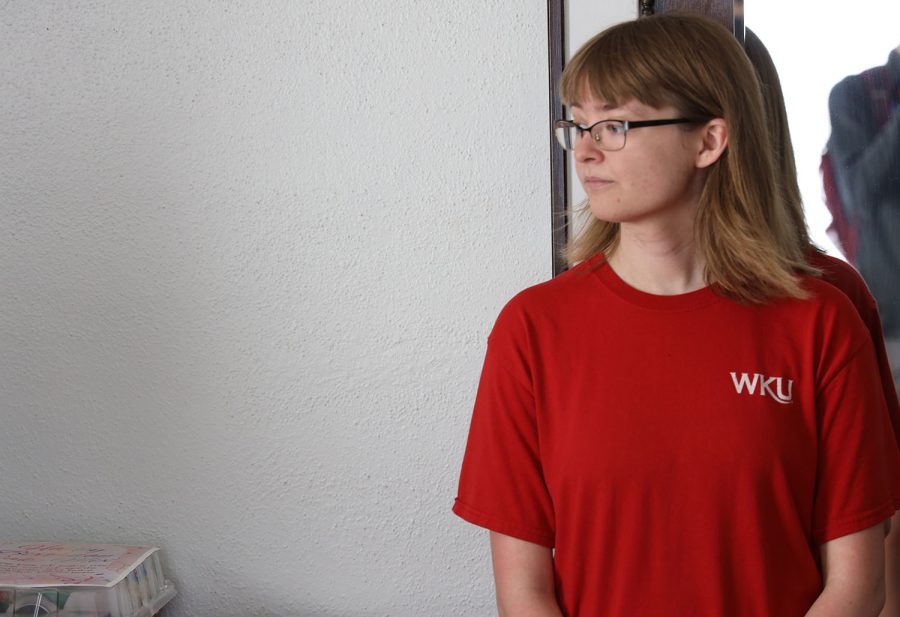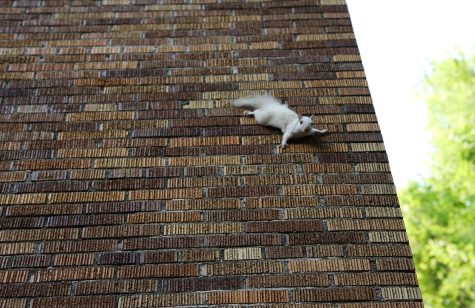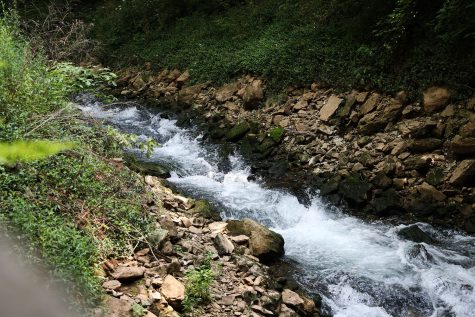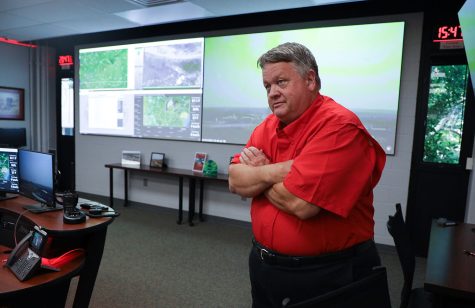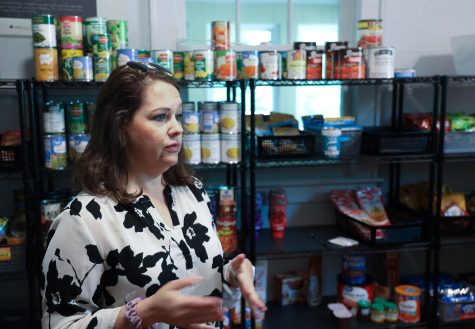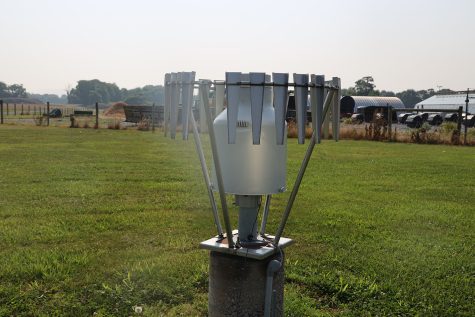Students power sustainability efforts at WKU
Nate Muller/Highlands High School
Grace Herrmann is a graduate assistant in WKU’s Office of Sustainability.
Students at Western Kentucky University are doing their part to improve the environment and community through their volunteer work with the university’s sustainability programs.
Leslie North, director of the Office of Sustainability at WKU, said student involvement is about 50-50.
“We have a lot of projects that start [as] one thing and then become kind of embedded into the overall institution as a whole, regardless of which, if those students move on,” she said.
One of those programs is the Food Recovery Network (FRN).
“The Food Recovery Network — that is kind of 50-50, so students do all of the work on that, but there’s a lot of paperwork and various things that have to go on behind the scenes that students can’t possibly do or understand,” North said. “So that falls on me to do all of those side of things.”
FRN is an organization that collects items from dining operations on campus, and then volunteers repackage them and distribute them.
“What the Food Recovery Network does is they go and collect [food] before they’re thrown away,” North said. “They come back to our office. They’re repackaged, they weigh everything so they know exactly how much they collected. And then that either gets distributed through the food pantry, or primarily where that goes is to other food pantries or hot meal lines.”
According to the WKU FRN website, in the United States, about one-third of all food is wasted, while about one in six Americans are food insecure.
The site said food waste has significant environmental impacts, such as wasted energy, soil degradation, water pollution and biodiversity loss.
WKU is one of over 230 colleges and universities with a student-run FRN that works to alleviate food waste’s environmental and social impacts by recovering leftover food from dining locations and donating that food to people in need.
Grace Herrmann, a graduate assistant for the Office of Sustainability at WKU, said student volunteers come in from “time to time” to help at the university’s food pantry.
“We will have some that will come in once a month,” Herrmann said. “Some that will come in weekly, and they’ll just stay for a couple of hours to help out if they have interest in different projects.”
The students are not paid either, Herrmann said. “We’ve had people come in just to partner with us on different projects that they’re interested in as well. Not so much being paid for; there aren’t a lot of funds, and what funds we have, we try our best to put them towards the pantry itself,” Herrmann said.
The food pantry began as a small idea that grew. Students saw their peers needed basic necessities and took action
“It was really students that drove that,” North said. “Things like the food pantry that started off as a student idea… seven or eight years ago, but as I mentioned during the press conference, it was quite literally in the back of a closet and a little tiny shelf.”
“Their idea was they saw that some of their peers needed food resources, and they didn’t have any place to go on campus or anything that they could really get to help them,” North said. “So that started as a student idea, but it’s led by this office, and [if]every student volunteer stopped coming today and we had no one of those people, the food pantry would still go on. Because it’s one of the programs that we specifically support financially and through staffing power through the Office of Sustainability.”
The WKU food pantry is an open-door organization that allows students, faculty, and staff to get the things they need for free. It enables students to bring non-perishables and toiletries to the office of sustainability for anyone to pick them up at any time.
The pantry is open to anyone who needs it; no proof of anything is required to access it.
Herrmann, who wears several hats for the Sustainability Office, including writing grants and creating infographics, said they work hard to spread the word about the organization and its initiatives.
“We will go out and tell people about the food pantry and about the Office of Sustainability, both to new students who haven’t been on campus but also will go to events being held on campus to make sure that more people know about the food pantry,” Herrmann said.
Another program that gives students a chance to assist with sustainability is Green Toppers.
“It is just the student organization related to groups of students who are interested in sustainability that can come from any major or background,” North said, adding the club brings in guest speakers and offers “fun activities.”
“It’s just kind of like a way to get people with like interest in hobbies. But the hobby or the interest, in this case, would be sustainability,” North said.
Green Toppers Students for Sustainability is an organization that promotes environmental education, sustainable living, and community service, according to its website. The club’s goal is to “bring sustainable practices to the local community by having a volunteer presence and spreading environmental knowledge through student-led educational opportunities.”
Habitat for Humanity is also a part of the sustainability plan at WKU. The program’s main priority is to bring students together to help build homes for families who may have lost their homes or have not had a home.
“[The] last couple of years, we’ve had somewhere around 45 to 55 [students]” said Bryan Reaka, adviser for WKU’s Habitat for Humanity.
Last summer, eight students helped build houses fafter a tornado in 2021 destoryed homes.
“We had students who came in for a week of building; we did 10 houses. Five of those were people who were directly affected by the tornadoes,” he said.
Students at WKU are very involved in their school and community. They bring ideas to the table that go toward helping their peers and those in their community. And they aren’t finished yet.
North said the sustainability program has plans for the future. One of those plans is a sustainability think tank. This will allow students to come together and think about solutions to a presented problem.
“And what that sustainability Think Tank is going to be is we’re going to have various problems that will get brought to the students working in that Think Tank, and they are going to be there to figure out solutions to them,” North said.

